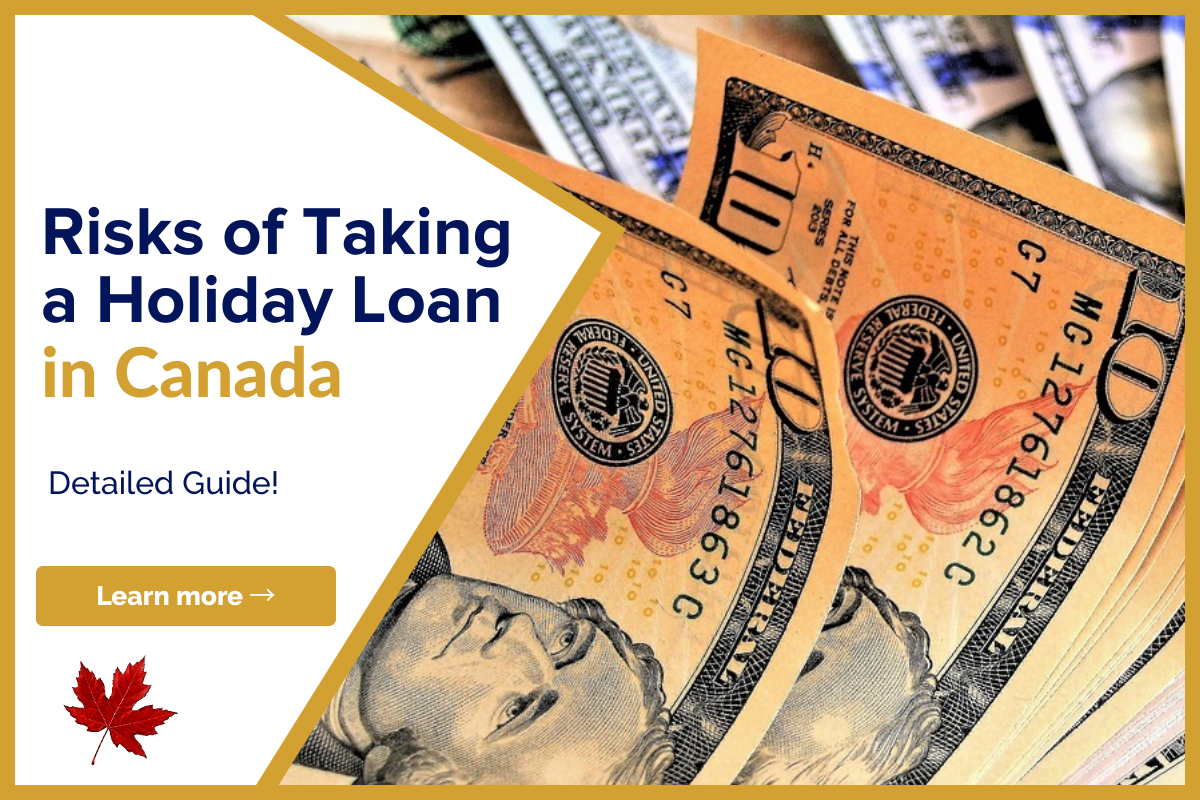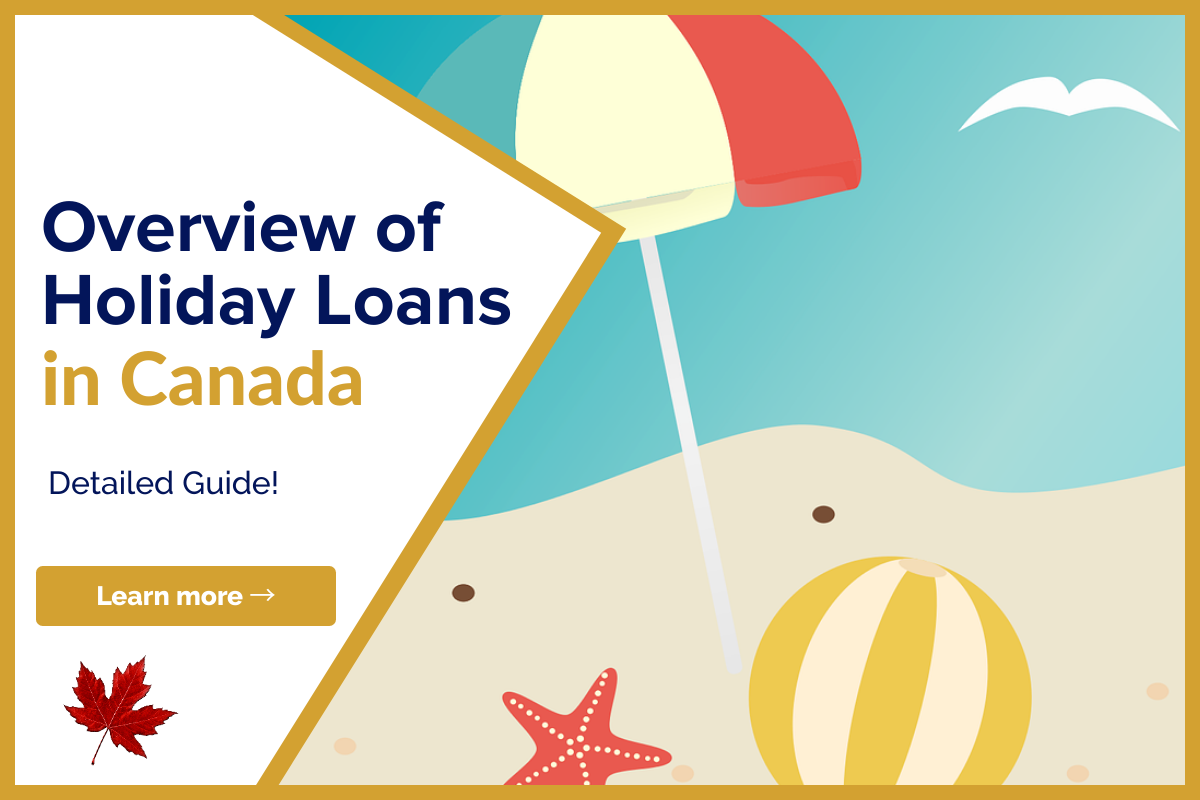Now you can listen to our blog post, "What is a good credit score for…

Risks of Taking a Holiday Loan in Canada
Now you can listen to our blog post, “Risks of Taking a Holiday Loan in Canada” while on the go.
Going on a holiday is a great way to relax, recharge and explore new places. However, it can also be expensive, and many people in Canada turn to loans to fund their vacations. While taking out a loan for a holiday may seem like a good idea, it comes with risks that need to be managed.
In this article, we will discuss the risks of taking a holiday loan and how to manage them in Canada.
-
Interest Rates
One of the main risks of taking out a holiday loan is the interest rates. Loans typically come with interest rates, which are the fees charged for borrowing money. The interest rate on a holiday loan can be significantly higher than other types of loans, such as a personal loan or a credit card. This is because holiday loans are often unsecured, meaning that there is no collateral to secure the loan.
To manage this risk, it is important to shop around for the best interest rates. Compare the rates offered by different lenders and choose the one that offers the lowest rate. It is also important to understand the terms and conditions of the loan, including any fees and charges.
-
Repayment Terms
Another risk of taking out a holiday loan is the repayment terms. Loans come with repayment terms, which are the length of time you have to repay the loan. Holiday loans often have short repayment terms, which can make the monthly repayments high.
To manage this risk, it is important to choose a repayment term that you can afford. Consider your monthly budget and choose a repayment term that fits within your budget. You can also consider making extra payments to pay off the loan faster and reduce the interest charges.
-
Hidden Costs
Holiday loans can come with hidden costs, such as application fees, prepayment penalties, and late fees. These costs can add up quickly and increase the overall cost of the loan.
To manage this risk, it is important to read the loan agreement carefully and understand all the costs associated with the loan. Ask the lender to explain any fees or charges that you do not understand. You can also negotiate with the lender to reduce or waive some of the fees.
-
Credit Score
Taking out a holiday loan can also affect your credit score. When you apply for a loan, the lender will check your credit score to determine your creditworthiness. If you have a poor credit score, you may be charged a higher interest rate or be denied the loan altogether.
To manage this risk, it is important to check your credit score before applying for a loan. You can request a free credit report from the credit bureau and check for any errors or discrepancies. If you have a poor credit score, you can work on improving it by paying off debts and bills on time, reducing your credit utilization ratio, and not applying for too many loans or credit cards at once.
-
Debt
Taking out a holiday loan can also lead to debt if you cannot afford to make the monthly repayments. This can result in additional fees and charges, damage to your credit score, and even legal action.
To manage this risk, it is important to have a plan in place to repay the loan. Create a budget and determine how much you can afford to repay each month. Stick to the budget and avoid taking on additional debt. If you are having difficulty making the repayments, contact the lender and explain your situation. They may be able to offer you a repayment plan or hardship assistance.
-
Scams
Finally, taking out a holiday loan can also expose you to scams. There are many fraudulent lenders who prey on people who are in need of a loan. These lenders may offer loans with low-interest rates or no credit checks but then ask for upfront fees or personal information.
To manage this risk, it is important to only deal with reputable lenders. Do your research and check the lender’s credentials before applying for a loan. Look for reviews and ratings from previous customers and check if the lender is registered with the Financial Consumer Agency of Canada (FCAC) or other regulatory bodies.
Additionally, be wary of unsolicited calls or emails offering loans, especially if they ask for personal or financial information. Legitimate lenders will not ask for upfront fees or sensitive information without proper verification.
Conclusion
Taking out a holiday loan in Canada can be a convenient way to finance your vacation. However, it also comes with risks that need to be managed. The key is to understand the terms and conditions of the loan, shop around for the best interest rates, and have a plan in place to repay the loan. It is also important to check your credit score, avoid hidden costs and scams, and be aware of the potential debt and credit score implications.
If you are considering taking out a holiday loan, make sure to evaluate your financial situation and only borrow what you can afford to repay. Consider other funding options, such as saving up or finding alternative sources of income. Remember, a holiday is a luxury expense and should not take priority over essential expenses.
Overall, with careful planning and management, a holiday loan can be a responsible and enjoyable way to fund your vacation in Canada.
Need Holiday Loan or Some Extra Cash to Help Your Finances? Try Lionsgate!
Are you struggling with your financial needs and need some extra cash? Lionsgate can help. Just fill out the form below, letting us know all your money or mortgage requirements, and we will find the best lender for you. Amazing thing? The process is free, and you can quit it at any time.
We have a team of experts that analyze your requirements and pick the best lender for you with prudent advice.
Note: Please give your authentic information while completing the form below.
Please share this article on your social media profiles if you found it helpful. Also, visit our blog to read similar helpful articles on finance, real estate, and getting mortgages.




